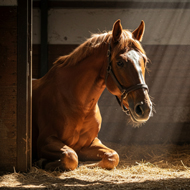Dogs Trust issues advice as winter warnings continue
Weather and flood warnings are still in place in some parts of the country.
Dogs Trust has asked dog owners to stay vigilant, as weather and flood warnings persist in many parts of the country.
The charity says that, with many popular walking spots flooded or frozen over, pet owners should not be tempted to let their dog play near dangerous waters.
Allowing a dog to play on iced-over bodies of water can be dangerous for both pets and their owners, as the ice may not be thick enough to hold their weight. This could mean the animal and its owner might fall through the ice into the life-threatening freezing water underneath it.
Flood water also poses a threat to dogs. As well as containing harmful toxins, which are dangerous if ingested, submerged hazards such as broken glass may be hidden in the water.
If a dog does fall through ice or enter flood water, Dogs Trust strongly recommends that pet owners do not go in after them.
Even in healthy people, cold-water shocks have the potential to cause a heart attack. Involuntary gasps and panic can also increase the likelihood of inhaling water directly into the lungs. Rescue services will always put the wellbeing of a human above their pet, and so entering dangerous waters could inadvertently put the animal in more danger.
Jenna Kiddie, head of canine behaviour at Dogs Trust, said: “If you are walking your dog anywhere near frozen lakes or floodwater, keep them on a lead.
“If your dog does go into the water, don’t follow them as this could lead to you requiring an emergency rescue, and could cause you serious harm. In the event of an emergency, call 999.”
Dogs Trust says that it is OK to avoid dog walking during icy conditions if a pet does not like it. Walks can be substituted for physical and mental exercise indoors, as well as regular toilet breaks.
If dog owners do choose to take their pet out for a walk, keeping the dog on a lead will prevent it from getting disorientated or lost in snowy conditions. Leads should be checked to make sure they are fully functional and not likely to rust.
Dogs, as well as their owners, should also be dressed in high-visibility clothing when conditions are not clear. High-visibility jackets and flashing collars should be introduced gradually to ensure the dog is comfortable wearing them.
Dogs Trust’s winter advice for dog care can be found here.
Image © Shutterstock



 Zoetis UK has called on horse owners to complete a short online survey about their horse's behaviours.
Zoetis UK has called on horse owners to complete a short online survey about their horse's behaviours.